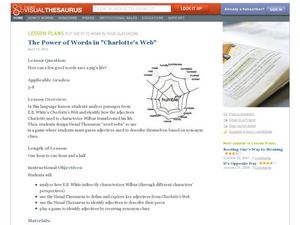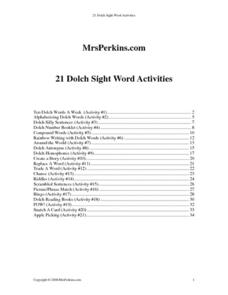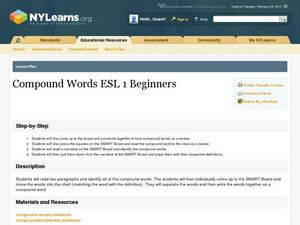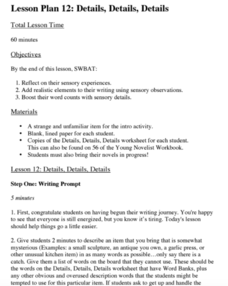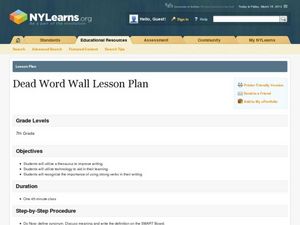K20 LEARN
Brushstrokes: Communication/Using Descriptive Language
Sometimes a picture reflects a thousand descriptive words. To illustrate the importance of sensory words in descriptive writing, scholars listen to a song and craft a painting in response. After sharing their work with the class,...
K20 LEARN
Sweet and Savory Writing: Descriptive Writing
The engagement is in the details. Young scholars learn the benefit of weaving descriptive and sensory details into the fabric of their writing through the activities in this lesson. As their hands explore items concealed in bags, a...
K20 LEARN
Who's Coming To Dinner? Descriptive Writing
"The Dinner Party" is the anchor text in a lesson designed to encourage writers to use sensory details in their stories. After brainstorming descriptive words and phrases for the five senses, class members read Mona Gardner's...
US National Library of Medicine
Drug Use and Abuse: Past and Present
Pick your poison: tobacco, alcohol, opiates, cocaine, or marijuana. An online exhibition launches a research project that asks groups to select one of the five drugs and gather information on how the use of the drug and the regulations...
EngageNY
Storyboard Revision: Managing the Sequence of Events and Using Sensory Details
Mastering techniques from the resource, pupils give life to their writing, revising their storyboards to include sensory details and transitions. To finish, they participate in a peer critique process and use the feedback to further...
Curated OER
The Power of Words in Charlotte's Web
"How can a few good words save a pig's life?" Posed with this question, your ELD students explore E.B. White's Charlotte's Web in a meaningful, valuable way. By analyzing specific word choice from the book, especially the excerpts...
Curated OER
Using Context Clues
Middle schoolers receive a handout that lists the five types of context clues. The class divides up into groups of three or four, and each group chooses five unfamiliar words. They write a multiple-choice question for each of their five...
Mrs. Perkins
21 Dolch Sight Word Activities
Strengthen your pupils' understanding of Dolch sight words with a packet of ideas. Kids can create stories, play bingo, make booklets, compose silly sentences, alphabetize, and much more.
EngageNY
Grade 11 ELA Module 1: Unit 1, Lesson 2
What do your words say about you? Scholars look closely at the Duke's words about the Duchess in Robert Browning’s My Last Duchess. Readers talk in groups to determine how the words help them learn more about the Duke. Learners also...
EngageNY
Using Tree Diagrams to Represent a Sample Space and to Calculate Probabilities
Cultivate the tree of knowledge using diagrams with two stages. Pupils create small tree diagrams to determine the sample space in compound probability problems. The instructional activity uses only two decision points to introduce tree...
Curated OER
Further Improvements of Writing Skills
Improve writing skills by finding a personal writing style, using descriptive language effectively, and using precise language. Middle schoolers discuss individual style in writing and formal and informal language. They utilize figures...
Institute for the Professional Development of Adult Educators
Using Context Clues with Signal Words
When you come across an unfamiliar word in a text, do you skip it and move on? Practice using context clues to identify words you don't know with a thorough set of language arts lessons. The resource reinforces close reading and critical...
Curated OER
Compound Words ESL 1 Beginners
Bring vocabulary to life with this SMARTboard activity! With a list of (linked) compound words, learners combine each part of the word to complete the compound word. They then read a narrative and identify the compound words. The last...
Curated OER
Details, Details, Details
Writing can become one-dimensional if authors don't involve all their senses. First, scholars observe a strange object which, ideally, they can touch and even smell. Without using certain words (you can create a list or have the class...
Curated OER
Dead Word Wall Lesson
Help your writers eliminate "dead words" (words that are overused) from their writing. This instructional activity includes a SMART board presentation that will guide them through identifying, eliminating, and substituting "dead words"...
Curated OER
Root Words from Greek and Roman Gods' Names
Prepare a stack of index cards with a Greek or Roman god's name on one side and their description on the other. Then, use the worksheet attached to brainstorm as many words that contain the root from each card. Pupils also create their...
Curated OER
The Use of Language in "I Know Why the Caged Bird Sings"
Readers of I Know Why the Caged Bird Sings are asked to craft an essay in which they compare how Maya Angelou uses figurative language to depict herself and Mrs. Flowers.
Curated OER
Writing and Presenting a Fable Using Research
Elementary and middle schoolers research animal facts and use them in a fable. First, they pair-share to find animal traits to use in writing a fable. They then complete a prewriting worksheet. After going through the writing process,...
Curated OER
Responding Syllables: Reading and Music
Shell Silverstein’s “Sick” provides an opportunity for kids to demonstrate their understanding of syllables and phonemes. The class creates a list of descriptive words used in the poem that have more than one syllable, and brainstorm how...
Curated OER
How Do Authors Use Imagery to Shape Their Writing?
Esther Forbes' award-winning Revolutionary War novel, Johnny Tremain and excerpts from Julie Otsuka's When the Emperor Was Divine are used to model how imagery brings alive the setting of a story. The young writers then craft their...
EngageNY
Conducting a Simulation to Estimate the Probability of an Event II
Add some randomization into simulations. The 11th installment in a series of 25 presents two new methods to use in simulations--colored disks, and random numbers. Pupils use random numbers to run simulations where the probabilities make...
Center for Civic Education
Women's History Month Word Clouds
What a great idea for celebrating Women's History Month and discovering the amazing efforts that individuals have put forth on behalf of women's rights! Learners take a closer look at the speeches and other primary source documents of...
K20 LEARN
Texture Poetry: The Great Gatsby and the Sense of Touch
To prepare for crafting a descriptive poem about a character in F. Scot Fitzgerald's The Great Gatsby, groups describe the texture of objects hidden in small bags. Individuals then select a character from the novel and an object...
Research Parent
Universe Cards
A 9-page packet comes with 24 cards that have pictures and informational text about each object in the universe. From nebulae to dwarf planets, objects we see—or don't see—are represented in the cards through pictures and words.





